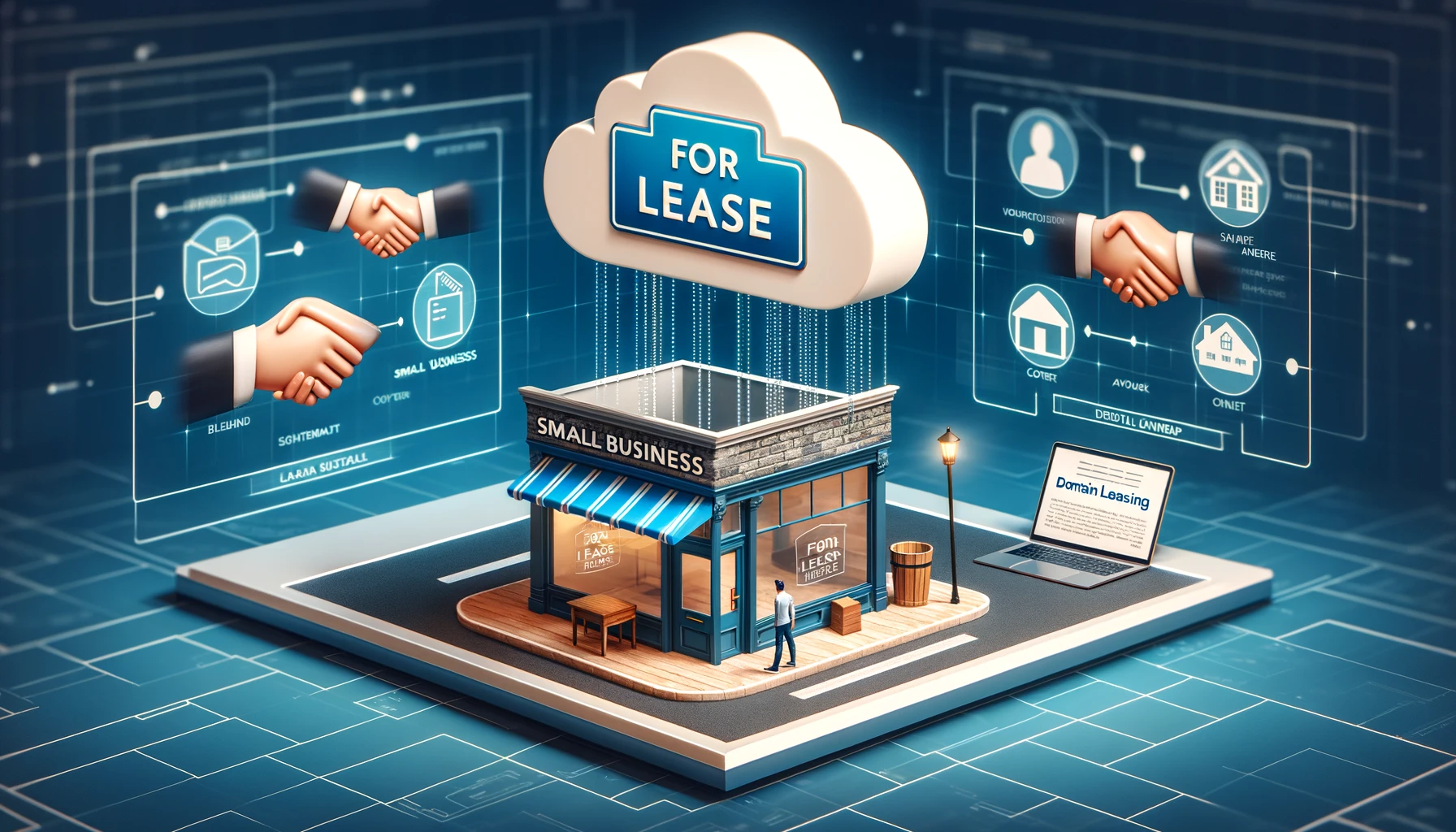When it comes to leasing a domain name, you should know a few things. This informative guide will walk you through the process of leasing a domain name from start to finish. You’ll learn about the benefits of leasing a domain name, as well as some of the potential drawbacks. By the end of this guide, you’ll understand whether or not leasing a domain name is correct for you.
What is a domain name, and why would you want to lease one?
A website can be identified on the internet by its unique address, known as its “domain name.” It is essential to your branding and how clients locate your website.
If you are not yet prepared to buy a domain name entirely, or if you wish to reserve a domain name for potential usage in the future, leasing a domain name is a smart alternative to consider. When you lease a domain name, you maintain complete control over the DNS settings and can utilize the domain for email, website hosting, and other uses. You can also purchase the domain name at a later date or transfer it to another service provider if you want to keep it.
Leasing a domain name is often more cost-effective than purchasing one outright, and it offers you the freedom to alter your mind at any point in the future. Most registrars will provide a price reduction on the domain name acquisition if you decide to buy it after you have leased it. Pricing for domain names considers both how popular they are and how long they have been since they were first registered. The asking price for acquiring or leasing a domain name goes up proportionately to the level of popularity of the name.
The process of leasing a domain name
The procedure of leasing a domain name is pretty straightforward to carry out. You can lease a domain name by first locating a reliable domain name provider and then choosing the domain name that you would want to lease from among the list of available domain names. After deciding on the perfect domain name for your website, you must submit your contact information and pay the associated charge. The domain name will be registered to you after successfully completing your payment.
It is essential to be aware that leasing a domain name does not do the same thing as acquiring the domain name outright. Instead, you will be charged a fee to use it for the allotted amount of time. If you want to keep using that domain name after that time has passed, you will need to renew your lease and pay the associated fees.
If you want to launch your website but don’t want to commit to it for an extended period, renting a domain name can be an excellent option. However, remember that certain registrars will automatically renew your lease after the predetermined amount of time has elapsed; this is an important fact to keep in mind. To avoid having the domain name lease automatically renewed after its current term has ended, you will need to make it known to the registrar that you do not desire to continue leasing the domain name before the current lease ends.
The advantages of leasing a domain name for a website
When it comes to introducing a brand-new website, there is plenty of things to take into consideration. Choosing the right domain name is one of the most crucial things you can do. Finding a domain name that is still available and appropriately expresses your company’s brand or product is not always easy. On the other hand, those who are having trouble locating an open domain name have the option to lease a domain name instead. This is a terrific choice.
There are a lot of advantages to renting a domain name. One of the advantages of doing so is that it enables you to use a premium domain name, which may not be accessible for individual purchases. This can assist you in attracting a more significant number of visitors to your website and boost the recognition of your brand. Additionally, renting a domain name rather than buying it is frequently the more cost-effective option.
Flexibility is another advantage of leasing a domain name rather than purchasing it. If you decide that you do not want the domain name anymore, you need only stop paying the lease, and the owner will regain ownership of the rights to use the domain name. A contract will not bind you for an extended time.
If you lease a domain name, you will also be able to set up personalized email addresses based on your domain name. Take, for instance, the case where you have a lease on the domain name mybusinessname.com.
The risks of leasing a domain name
When you sign a lease for a domain name, you essentially agree to pay the owner of the domain name for the use of it for a predetermined amount of time. Due to the many factors involved, this is potentially a high-risk endeavor. Your entire online presence, including your website, might vanish in an instant if the owner of the domain name decides to stop leasing it out. First and foremost, this could happen.
Second, if the owner sells the domain name while you are still leasing it, you may be subject to significant price hikes or even be required to give up the domain name altogether.
Thirdly, it is essential to keep in mind that the lessee of a domain name can negotiate many of the lease agreement terms with the domain name’s owner. If you do not adhere to these conditions, you may be required to give up your lease and risk having your website taken away entirely.
Last but not least, it is possible that the search engine ranking and visibility of your website will suffer if the owner of the domain name does not keep it updated and well-maintained. Because of these factors, before making any commitments, it is essential to consider whether or not leasing a domain name is the best option for your company before making any commitments.
Things to think about before signing a lease for a domain name
Before you sign a lease for a domain name, there are a few things you need to bear in mind. The first thing you need to do is check to see if the desired domain name is available. You can check the availability of a domain name by visiting the Internet Corporation for Assigned Names and Numbers (ICANN), also known as your hosting business, or by visiting the website of ICANN.
The second step is to investigate whether or not the domain name has been rented in the past. You can accomplish this by searching for the domain name on the website of ICANN or by getting in touch with a domain name broker.
The next step is to check and see that the domain name has been registered with the appropriate authorities.
Last but not least, it is essential to be aware of any restrictions that may apply to the domain name, such as copyright or trademark concerns.
For instance, some domain names may be copyrighted or registered as trademarks, which would restrict you from making use of those domain names. You can get more information about whether or not a specific domain name has restrictions by contacting the company that manages the domain name.
How to find the right domain name to lease
When selecting a domain name to lease, there are a few crucial aspects to remember.
Consider first why you’re visiting this page in the first place. The substance of a website needs to be reflected in the domain name. For instance, if you lease a domain for a website used for your company, you will want to select an authoritative and straightforward name to keep in mind.
Next, give some thought to your financial plan. Domain names can be leased between ten and twenty dollars up to several thousand dollars per month, depending on the worth of the domain and what the owner wants to lease it for. Domain names can also be purchased outright. You will want to look for anything that is reasonably priced relative to your budget.
Lastly, check to see if the desired domain name is available. You can check to see if the domain you want is available to lease by using a website like Dan.com. If so, add it to your shopping cart and proceed with the checkout procedure.
Conclusion
Leasing a domain name is not nearly as difficult of a process as it may appear at first glance. If you carefully follow the instructions in this article, you can confidently register a domain name for your website or company.
It is essential to perform adequate research and ensure that one is familiar with all of the terms associated with leasing a domain name before making any decisions. As soon as you have sufficient comprehension of the procedure, you can start looking for available domain names.
There is a large number of respectable businesses that provide services related to domain leasing. Before you make a choice, you should check out the market and compare prices and features. Once you have located a business that meets all of your requirements and expectations, leasing a domain name is uncomplicated and uncomplicated.
Leasing a domain name is a fantastic option for getting your website or online business off the ground because it frees you from the obligation of making a long-term commitment.





